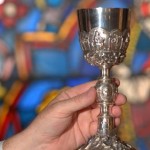This year, I decided to have prizes for the Ideological Turing Test, and to have the winners pick them out for each other. The two contestants who were most successful at aping the other side swapped books, and so did the two people who, when writing their true beliefs, were the contestant that the opposing side most wanted to have coffee with. I asked each of them to give a few reasons for their recommendations before I made the purchases. (And, for reasons that will become obvious, I was very tempted to title this post “Christian H Does Your Holiday Shopping For You!”).
Chana (A) choosing for Gilbert (C) and Christian (C)
Chana was both the atheist most likely to be mistaken for Christian by Christians, when she tried her hand at imitating Christian thought (entry C4) and was the atheist that, when writing as herself, was most likely to spur Christians to wish to have pugnacious coffee with her (entry A5). She writes at The Merely Real and contributes to Strange Notions.
Chana chose to buy the same book for her two counterparts, David Deutsch’s The Beginning of Infinity: Explanations That Transform the World. Since she didn’t include a write-up, I’ll crib from Amazon:
In this groundbreaking book, award-winning physicist David Deutsch argues that explanations have a fundamental place in the universe—and that improving them is the basic regulating principle of all successful human endeavor. Taking us on a journey through every fundamental field of science, as well as the history of civilization, art, moral values, and the theory of political institutions, Deutsch tracks how we form new explanations and drop bad ones, explaining the conditions under which progress—which he argues is potentially boundless—can and cannot happen. Hugely ambitious and highly original, The Beginning of Infinity explores and establishes deep connections between the laws of nature, the human condition, knowledge, and the possibility for progress.
Gilbert (C) choosing for Chana (A)
Gilbert blogs at The Last Conformer, and his atheist round entry (A10) was the most plausible Christian entry according to true atheists.
Leah has asked me to pick a book prize for Chana and my choice is The Genesis of Science: How the Christian Middle Ages Launched the Scientific Revolution by James Hannam.
While I’ll admit to choosing this book with a somewhat apologetic purpose, it isn’t directly about the truth of Christianity. In fact, I expect Chana to agree with basically everything it says and still remain a staunch atheist, at least for now. That’s fine by me, because my evil plan is more underhanded: I’m trying to shift the question rather than the answer.
A lot of smart atheists trying to understand theists – and Chana in particular – wonder how we reconcile faith and reason. The official and correct Catholic answer is pretty much that this is not a problem because our faith is reasonable. And the proper direct way to deal with this concern is to disaggregate the vague concepts of “faith” and “reason” and then look at the easier individual questions. They tend to separate into counter-factual what-thens with obvious authoritative answers, political rather than epistemological conflicts, and questions that can be dissolved by recursively applying the same strategy. Chana herself has successfully used that strategy in other contexts.
But in a way this ignores the more general expectation behind the concern. There actually is a guiding principle or narrative behind all these questions. For example, this type of question tends to come up for religion much more than e.g. for feminism or libertarianism, because that’s where the cultural expectation of conflict lies. I think that narrative is simply false, but it is much to big and vague to engage directly. However, there used to be a very tangible side to this narrative: the conflict thesis. This book is an excellent take-down of that thesis. So, even if for all I know Chana might not actually believe the actual conflict thesis, I would hope that a detailed look at howbogus the tangible part of the narrative of her concern was might push her towards wondering if the rest of it doesn’t look a lot like an invisible dragon.
As for the credibility of the book, I’ll note that its British edition was shortlisted for the 2010 Royal Society Prize for Science Books. So while it does have a bit of an agenda, it also is a valid popularization of history as academic historians now understand it.
Christian H of (C) choosing for Chana (A)
Christian H writes at The Thinking Ground, and his honest Christian entry (C3) was the one whose author atheists most wanted to take out for coffee and a chat.
- This is more than a book recommendation for Chana Messinger. Leah will presumably be buying it, so I want to keep the price in mind. However, it also doubles as a book recommendation for Leah, too, since she’ll be going to all the trouble of buying and surely she must be curious. Further, iff Leah goes ahead and puts the recommendations online, then it’s a recommendation for all of the UY community–and not just me spouting unsolicited recommendations in the combox, but a properly sanctioned above-the-fold recommendation. So, there’s an audience.
- But this is primarily a recommendation for Chana Messigner. That’s absolutely my priority; I have a reputation as a good recommendation-giver to uphold, after all, and muddling the motives won’t help that. However, other audience stuff can be a tie-breaker.
- So, what do I know about Chana, based on her blog: foxes and hedgehogs (I liked that article); reads Less Wrong avidly, a big one on rationalism, in Yudkowsky’s sense, not any of the other many many possible senses; OK with challenging religious beliefs, but within range of appropriateness and respect; claims to be happy to hear about new ideas, arguments, and evidence; high school math teacher (and so young! ~21); claims to be interested in logic, politics, economics, philosophy, linguistics, atheism, religion, community-building, argumentation, education; NOTHING about fiction!
- Suggests rigour of thought, wide-ranging interest (but a bit heavier on science than humanities), sounds fairly compassionate. I’ll maybe prefer things that are intellectually rigorous, or fiction that is especially good.
- I’d put Prothero’s God is Not One on the list except that it likely won’t offer much she doesn’t know, and anyway the fox/hedgehog thing comes to mind: Prothero’s thesis suggests that all religious people think like hedgehogs, not foxes, and that’s a big problem! And I’d likely put some more lit crit stuff on, except I’m not sure how accessible it would be to someone not in the field. Further, I’m assuming that Leah herself will have pushed Arcadia, Stories of Your Life and Others, and Gunnerkrigg Court on Chana already, so I needn’t recommend those. It’s probably also a bad idea to give poetry in this kind of thing, as not very many people like poetry.
- I’d like to see more Canadian stuff on this list, but…ehn. It would be kind of silly to make Canadian-ness a criterion here, even as much as I’d like to promote our under-attended national lit.
- Geez, I’m much better at giving recommendations when I know the person than in a situation like this; this is the kind of thing that’s best tailored to a particular person, with whom I have a particular relationship, than a sort of shot-in-the-dark thing. Well, anyway, I can give it a shot. What’s the harm?
The Long List, alphabetical by author
1. Borges, Jorge Luis. Collected Fictions – Gorgeous, thought-provoking, humane; mystical, maybe a little undisciplined
2. Carr, Caleb. The Alienist – Fascinating, interesting historically and intellectually; it’s been a long time since I read it, so my recommendation would have to be uncertain
3. Chesteron, G K. The Man Who Knew Too Much – Clever, I like what it says about justice; a bit sexist, racist, colonialist, a bit preachy
4. Cogburn, Jon and Mark Silcox. /Dungeons & Dragons and Philosophy: Raiding the Temple of Widsom/ – It looks really interesting; I haven’t read it yet
5. Davis, Wade. One River – Intellectual history stuff, quite interesting; long, drags a bit
6. Davis, Wade. The Wayfinders – Humane, I like the idea about creative/intellectual resources; maybe not for everybody?
7. Dreger, Alice Dorumat. One of Us: Conjoined Twins and the Future of Normal – I really like the ideas, I think maybe Dreger’s approach will be of interest to Chana; maybe excessively academic, non-fun?
8. Dunn, Katherine. Geek Love – Gorgeous, brilliant, well-written; depressing, bizarre
9. Goto, Hiromi. Half World – Lovely, pacist, fun; hard to handle for some people, maybe not as intellectually tight as some of the other options?
10. Green, John. Paper Towns – Humane, literary, gripping; YA may not appeal to everyone
11. King, Thomas. Green Grass, Running Water – Oh my goodness, what an excellent book, the best kind of experimental writing, hilarious; maybe a high chance she’ll have read it (maybe? what’s its visibility in the States?)
12. Mendely, Linda. Castle Waiting – Humane, hilarious, creative, graceful; maybe not as philosophically-inclined as Chana might like?
13. Poortvliet, Rien. Journey to the Ice Age – Utterly gorgeous, I’d recommend it to anyone who is sighted and has any taste at all; incredibly expensive
14. Shapiro, James. A Year in the Life of William Shakespeare: 1599 – Fun history and literary criticism stuff, decently written; very narrow interest
15. Wecker, Helene. The Golem and the Jinni – It deals with some lovely stuff w/r/t freedom v service, other pet projects of mine, character-driven; these are pet projects of mine, writing a tiny bit uneven
—
The Short List, alphabetical by author
1. Borges, Jorge Luis. Collected Fictions What would he look like to a mathematician? Maybe really interesting, maybe not. Borges is evocative, but not rigorous. Hmm hmm hmm.
2. Davis, Wade. One River Very interesting. Also very long. Not generalist knowledge, highly specific. A little weird in places.
3. Davis, Wade. The Wayfinders If Chana is interested in new ideas and arguments, and in religion, this might be of some interest to her. But I found this book to be as much of a downer as it was informative.
4. Dreger, Alice Dorumat. One of Us: Conjoined Twins and the Future of Normal Fascinating, clever, both science-y and interpretive, but definitely not as fun as the alternatives.
5. Goto, Hiromi. Half World Fun but certainly depressing and in many places hard to read. It cares about people, reconciliation.
6. Green, John. Paper Towns Same as Goto, I guess, but less so, and far more fun/less depressing.
7. King, Thomas. Green Grass, Running Water Pretty brilliant. I’m always a little hesitant to suggest it to an atheist, but I oughtn’t be, b/c it’s not like it’s going to make them change their mind about Christianity or anything.
—
Verdict
In order, assuming that she doesn’t have the book already (to Leah’s knowledge):
1. Borges, Jorge Luis. Collected Fictions [this is the one I sent – Leah]
2. King, Thomas. Green Grass, Running Water
3. Dreger, Alice Dorumat. One of Us: Conjoined Twins and the Future of Normal [I was so tempted to send this one, but recognized that means that I should read it – Leah]
4. Davis, Wade. The Wayfinders
Jeez oh man, if you didn’t already vote for Christian as someone you wanted to have coffee with in the Turing Test, surely you want to head Canada-wards now.













